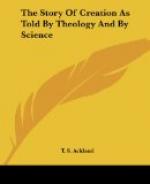Our first difficulty arises from a matter which, viewed in another light, is one of our greatest blessings. We are familiar with the Record through the medium of our own noble version. Probably it is impossible for any translation more exactly to represent the original as it presented itself in the first instance to the minds of those to whom it was addressed. Accordingly we learn it in our earliest childhood; its majestic phrases imprint themselves on our memory; our undeveloped minds seem capable of taking in all that it was intended to convey, and so the impressions formed of it in our infancy abide with us all our days. We are contented with them, and do not trouble ourselves to inquire whether there is not something beyond, which we have not realized.
All this time we forget that, excellent as it is, it is after all only a translation, and that the very best translation cannot represent in their fulness the ideas embodied in the original. Etymological relations between words often give a force and meaning to a sentence which it is impossible to transfuse into another language, because the same relations do not exist between the words which we are constrained to employ. Then there is an intimate relation between men’s thoughts and the language which they habitually use, so that those thoughts cannot be perfectly expressed in a language whose character is different. Again in every language there are many words which bear several cognate senses, which may be represented by as many different words in the language of the translation; so that if the best word is chosen, much of the fulness of the original must be lost; while it may so happen that the selected word has also a variety of significations, which do not correspond with the varying meanings of the original word, and thus senses may be ascribed to the original which it will not bear, because the reader annexes to the word in the translation a sense different from that in which it corresponds to the original word. To all these sources of imperfection must be added the fact that our translation was made at a time when science was not yet sufficiently developed to exercise any influence upon it. There was nothing to induce the translators to attempt, where it was possible, to preserve any indications of a deeper meaning, because they had no reason to suspect that any such deeper meaning existed, or that any indications of such a meaning were to be found.
To the difficulties of translation must be added the difficulties of accumulated tradition. The characteristics which mark our own childish intellect are apparent also in the collective intellect of the human race in its earlier and ruder development. There are two characteristics of the human mind in this condition, which have had a very great effect on the interpretation of this portion of the Bible.




